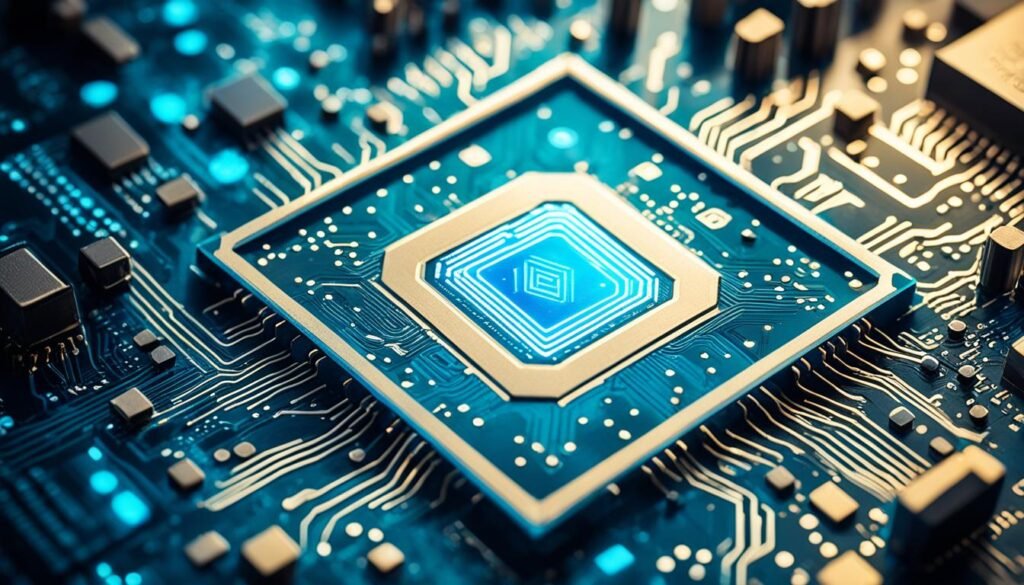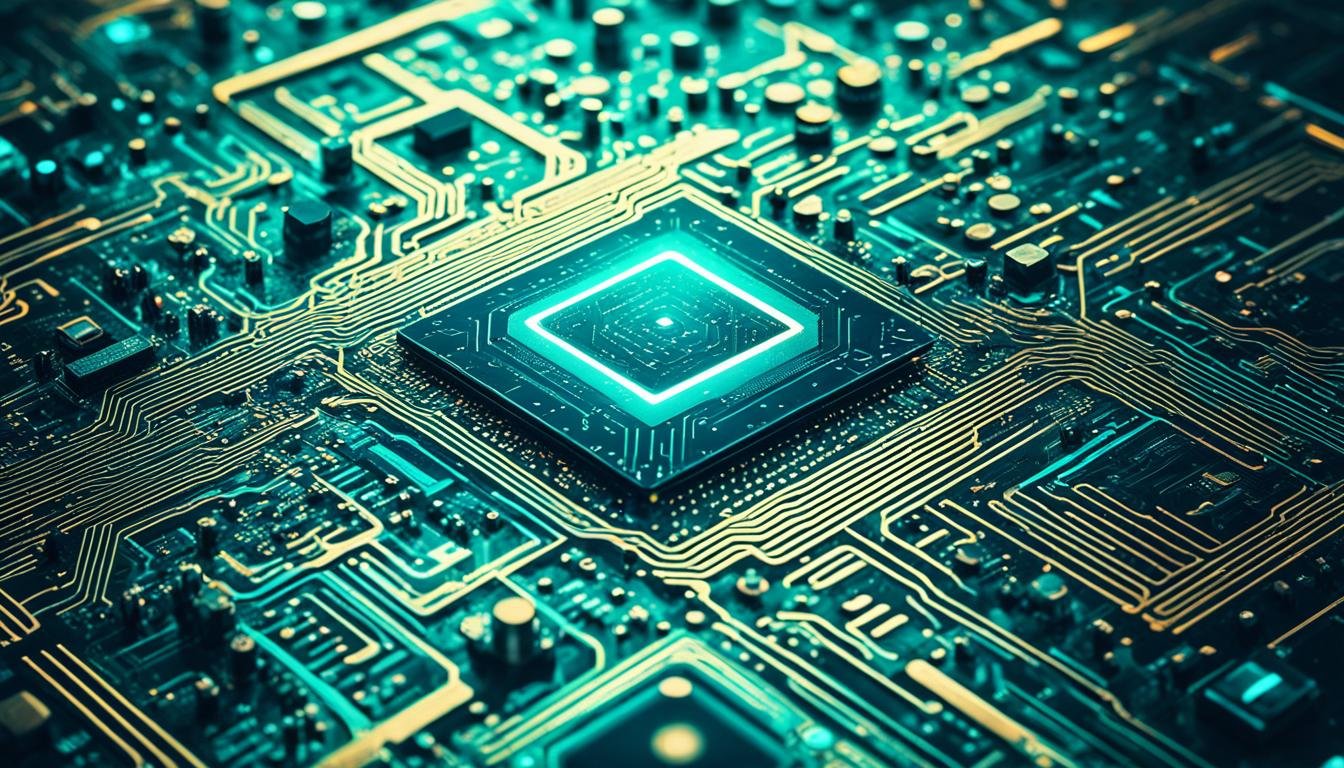Geometry is a key part of math that has been tough for AI systems. But, things are changing. Researchers at Google DeepMind have made a big step forward. They’ve created an AI that can solve tough geometry problems from the International Mathematical Olympiad.
This AI, called AlphaGeometry, is amazing. It can solve 25 out of 30 Olympiad geometry problems in the time allowed. This is more than the best system before could do, which only solved 10 problems.
AlphaGeometry’s success shows how far AI has come, especially in solving math problems. This breakthrough means AI can handle complex logical challenges. It also shows AI’s potential to expand human knowledge.
Key Takeaways
- DeepMind’s AlphaGeometry can solve 25 Olympiad-level geometry problems, surpassing previous systems.
- The AI was trained on 100 million synthetic theorems and proofs to learn general geometry rules.
- AlphaGeometry combines a neural network and a symbolic deduction engine to solve problems.
- The system’s success highlights the potential of AI in advancing mathematical reasoning and problem-solving.
- Researchers hope AlphaGeometry will inspire further progress in AI and mathematics.
AlphaGeometry: DeepMind’s Geometry Problem-Solving AI
Artificial intelligence (AI) has made huge leaps in solving tough math problems. DeepMind’s AlphaGeometry is a big step forward. It uses a neural language model and a symbolic deduction engine to solve hard geometry problems.
DeepMind’s Approach to Solving Olympiad Geometry Problems
DeepMind’s team came up with a new way to make AlphaGeometry. They combined a “neural language” model with a “symbolic deduction engine.” The neural model helps the system understand geometry in an “intuitive” way. The symbolic engine makes careful, logical choices to solve problems.
To fix the lack of training data, DeepMind created 100 million synthetic theorems and proofs. This let AlphaGeometry learn from scratch, without needing human help.
Synthetic Data Generation for Training AlphaGeometry
AlphaGeometry’s success comes from using lots of synthetic training data. By making one billion random diagrams, the team gave the system a wide variety of examples. This helped it learn to solve many Olympiad-level geometry problems.
The language model in AlphaGeometry suggests useful ideas. The symbolic engine uses these ideas to find solutions. This mix of quick thinking and careful planning has made AlphaGeometry very good at solving geometry problems.

DeepMind’s work on AlphaGeometry could change how we solve math problems. It combines neural and symbolic thinking in a new way. This shows how far AI has come in solving geometry problems.
The Challenge of Reasoning in Geometry for AI
Geometry and math have been tough for AI researchers. There’s much less training data for math than for text-based AI. This is because math is all about symbols and is very specific. Solving math problems needs logical thinking, which current AI models find hard.
This is why math is key to testing how smart AI can get. It shows how well AI can understand and solve complex problems.
Logical Reasoning and Theorem Proving in Mathematics
AI has made big strides in many areas, but geometry is still a challenge. It needs deep understanding of context and visual-spatial skills. AI often misses the subtleties that come from human learning and experience.
Geometry proofs are all about complex logical thinking. AI can do individual tasks well but finds it hard to link different pieces together. Understanding and creating diagrams is tough for AI in geometry, as it requires visual-spatial smarts.
Explaining geometric concepts and logical steps in words is hard for AI too. AI’s language skills can result in simple or wrong explanations of geometry proofs. Good geometry proofs need to blend different theorems and principles smoothly, something AI models struggle with.
To improve AI in geometry, we need better training data, algorithms that think like humans, and better language skills. AI models must be able to combine knowledge from various areas to solve geometry problems well.

AlphaGeometry’s Two-Part System: Neural Network and Symbolic Engine
DeepMind’s AI system, AlphaGeometry, has a unique way to solve complex geometry problems. It uses a neural network and a symbolic engine together. This is similar to how humans solve such problems.
The neural network part of AlphaGeometry comes up with creative ideas, like our brains do. It looks at a huge dataset of synthetic geometry to find new insights and ways to solve problems. The symbolic engine, on the other hand, uses logical rules to guide the solving process. This makes sure the solutions are thorough and correct.
By combining these two parts, AlphaGeometry can handle even the toughest ai geometry problem solver tasks. The neural network sparks new ideas, and the symbolic engine keeps the solutions mathematically sound. This mix lets the AI excel in ai-powered geometry learning, beating past top systems.
AlphaGeometry’s new way of solving problems has shown great success. In a test, it solved 25 out of 30 hard Olympiad-level questions. This is a big jump from the previous best solution that could only solve 10 questions.
This success of AlphaGeometry’s system shows the strength of ai for geometry. It also shows how well neural networks and symbolic reasoning work together. As AI keeps getting better, this breakthrough points to the future of smart systems solving complex math problems with great skill and creativity.

“The combination of creative thinking and rigorous reasoning allows AlphaGeometry to tackle complex geometry problems in ways that were previously out of reach for AI systems.”
Evaluating AlphaGeometry on International Mathematical Olympiad Problems
The team at DeepMind has made a big leap with their geometry ai assistant, AlphaGeometry. They tested it on problems from the International Mathematical Olympiad (IMO). This showed how far AI has come in solving complex math problems.
AlphaGeometry’s Performance on Olympiad Geometry Problems
AlphaGeometry did amazingly well, solving 25 out of 30 geometry problems. These problems were as tough as those in the IMO. It beat the old top system, which could only solve 10 problems. This shows how much AI geometry tutor systems are getting better at complex math.
The ai and geometry education world is excited about AI tools that help with hard geometry problems. AlphaGeometry’s success on IMO problems shows how geometry ai assistant systems could change math problem-solving.
“AlphaGeometry solved this year’s geometry problem in just 19 seconds after receiving the formalized version, a feat that would have taken human competitors hours to accomplish.” – DeepMind Researcher
DeepMind’s team has made huge strides, showing AI can beat humans in certain math areas. As ai geometry tutor systems keep getting better, the future of ai and geometry education looks very promising.

The Symbolic vs Neural Network Debate in AI
DeepMind’s AI system, AlphaGeometry, shows the debate in the AI world. It combines a neural network with a symbolic engine. This mix aims to solve complex math problems better.
Neural network fans believe smart actions come from data and computation. Symbolic AI supporters say it’s best for storing knowledge and solving complex problems. AlphaGeometry’s win in geometry challenges shows mixing these methods works well.
The AlphaGeometry neural network part recognizes patterns and learns complex geometry. The symbolic engine does logical thinking and checks math proofs. Together, they make solving geometry problems more effective.
AlphaGeometry uses synthetic data to overcome the problem of not having enough training data. It learned from 100 million fake geometry examples. This helped the neural network understand geometry deeply.
AlphaGeometry’s success shows hybrid AI models can be powerful. As AI research grows, we might see more progress in physics, finance, and other areas. Combining data learning with logical thinking can lead to big discoveries and solutions.
| Approach | Strengths | Limitations |
|---|---|---|
| Neural Networks |
|
|
| Symbolic AI |
|
|
Systems like AlphaGeometry show how AI can solve tough challenges by using both neural networks and symbolic AI. As ai geometry problem-solving and ai in geometry teaching grow, AlphaGeometry’s approach might lead to more AI-driven math solutions.
Can AI Solve Geometry Problems? Insights from AlphaGeometry
DeepMind’s AlphaGeometry has made big strides in solving geometry problems, raising hopes about can ai solve geometry problems. This AI system shows off its problem-solving and reasoning skills. It could greatly help in advancing math, science, and AI.
AlphaGeometry solved 25 out of 30 geometry problems from the International Mathematical Olympiad from 2002 to 2020. It matched the scores of top students in the competition. The team trained AlphaGeometry with millions of theorems and proofs, making it better than other AI at solving geometry.
AlphaGeometry found a new way to apply a translated IMO theorem from 2004 to any quadrilateral, not just parallelograms. This shows it can explain its solutions in natural language and math symbols.
“AlphaGeometry produces clean, human-readable proofs using standard geometry techniques,” noted Evan Chen, a former Olympiad gold medalist and mathematics coach.
AlphaGeometry is great at solving basic math problems but can’t handle complex university-level problems yet. Still, its ai-powered geometry learning could help in engineering and education. It could make learning geometry easier for students and teachers.
DeepMind’s work on geometry shows how AI can get better and make AI systems more efficient. As AlphaGeometry gets better at math, it could solve more complex problems. This could lead to big advances in artificial general intelligence.
Implications of AlphaGeometry for AI and Mathematics
The success of Google DeepMind’s AI systems AlphaProof and AlphaGeometry is huge for artificial intelligence and mathematics. These systems have shown they can solve complex geometry problems. They even did well in the International Mathematical Olympiad.
This means they could change how we solve geometric problems and think mathematically.
Advancing Geometric Problem-Solving in AI
AlphaGeometry can solve complex geometry problems very well. It’s as good as an average top math student. This shows how far ai geometry problem solver technology has come.
The system creates human-readable proofs and makes new geometric elements. This has set a new standard for AI in geometry.
Potential Applications Beyond Mathematics
AlphaGeometry’s skills could also help in fields like computer vision, architecture, and theoretical physics. The creators of AlphaGeometry want to use this tech in more math areas. They see geometry as a way to show AI’s deep thinking and discovery abilities.
| Key Achievements of AlphaGeometry | Impact and Potential Applications |
|---|---|
|
|
AlphaGeometry’s success goes beyond just solving geometry problems. It shows the power of ai in geometry teaching and its wide uses. As geometry ai assistant technology grows, AlphaGeometry’s work will lead to new breakthroughs in AI and math.
Limitations and Future Directions for AlphaGeometry
AlphaGeometry can solve simple math problems but struggles with complex university-level ones. Mathematicians hope AI can solve research math problems, leading to new insights. They want to make AlphaGeometry better at solving a variety of math problems, showing AI’s deep reasoning skills.
AlphaGeometry, trained on 100 million examples, solved 25 out of 30 IMO geometry problems. Yet, it doesn’t match human gold medalists’ scores, who solve about 25.9 problems. The team aims to improve AlphaGeometry to be as good as the best human mathematicians.
The DeepMind team is excited to see how can ai solve geometry problems, ai geometry problem-solving, and geometry problem ai can handle harder math. They want to use AI to explore new areas in geometric problem-solving. This could lead to new insights and uses in mathematics.
FAQ
What is AlphaGeometry, and how does it solve geometry problems?
AlphaGeometry is an AI system made by DeepMind. It can solve geometry problems as well as the International Mathematical Olympiad. It uses a neural network for intuitive ideas and a symbolic engine for logical reasoning.
How did DeepMind train AlphaGeometry to solve geometry problems?
DeepMind created 100 million synthetic theorems and proofs to train AlphaGeometry. This mix of a neural network and a symbolic engine helps AlphaGeometry solve complex geometry problems.
Why is solving geometry problems an important milestone for AI?
Geometry has been a challenge for AI researchers. It requires logical reasoning, which current AI models find hard. So, solving math problems is a key test of AI’s progress.
How does AlphaGeometry’s performance on Olympiad-level geometry problems compare to previous systems?
DeepMind tested AlphaGeometry on 30 geometry problems at the International Mathematical Olympiad level. AlphaGeometry solved 25 problems within the time limit. This is better than the previous best system, which solved 10.
What are the implications of AlphaGeometry’s success for AI and mathematics?
AlphaGeometry’s success shows AI can develop advanced problem-solving skills. This could help advance mathematics, science, and AI. But, it can only handle “elementary” math problems, not the complex ones at university level.
What are the limitations of AlphaGeometry, and what are the future directions for the research?
AlphaGeometry can solve simple math problems but not the complex ones at university level. Mathematicians want to see if AI can solve research math problems, leading to new insights. They aim to make AlphaGeometry better at tackling various math fields and deep reasoning.
